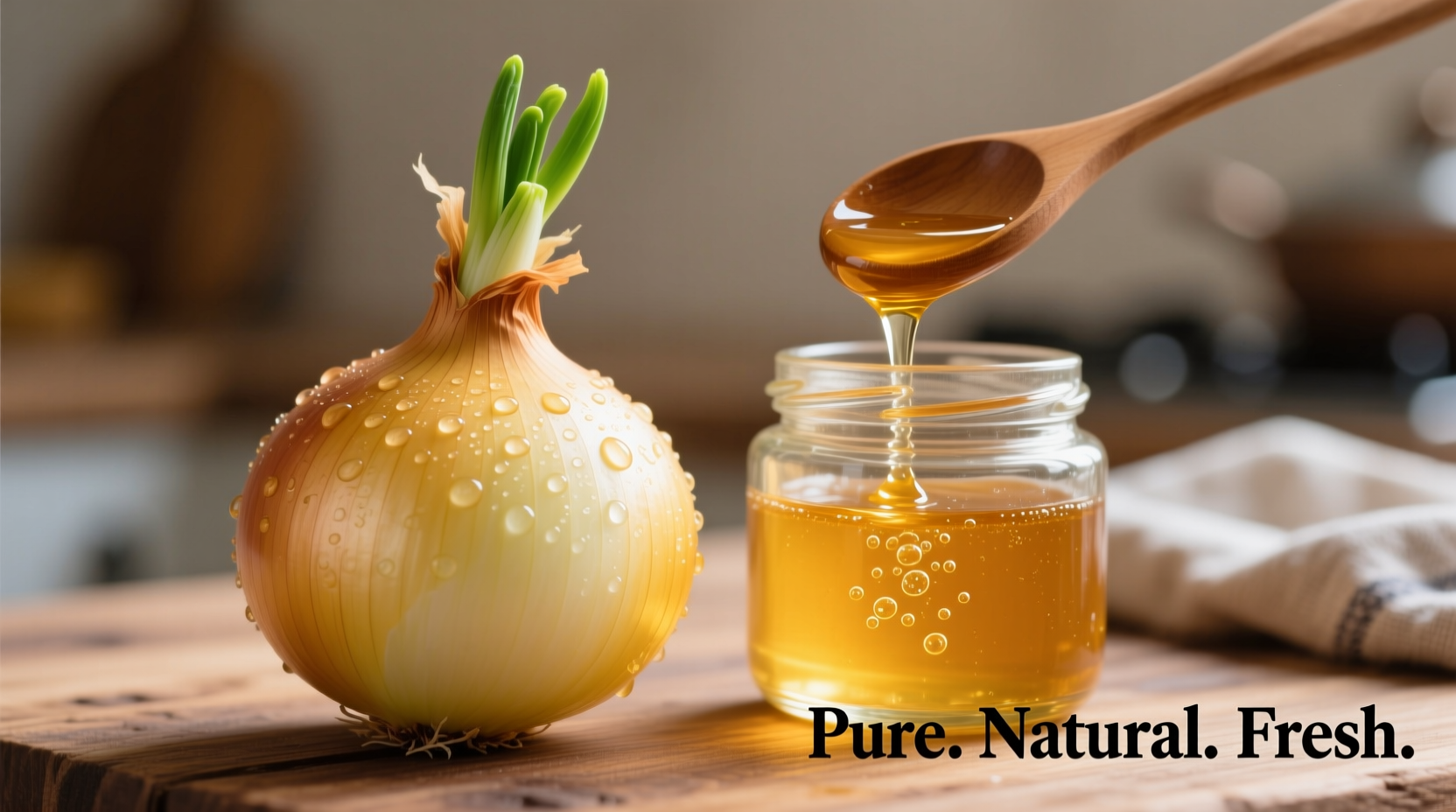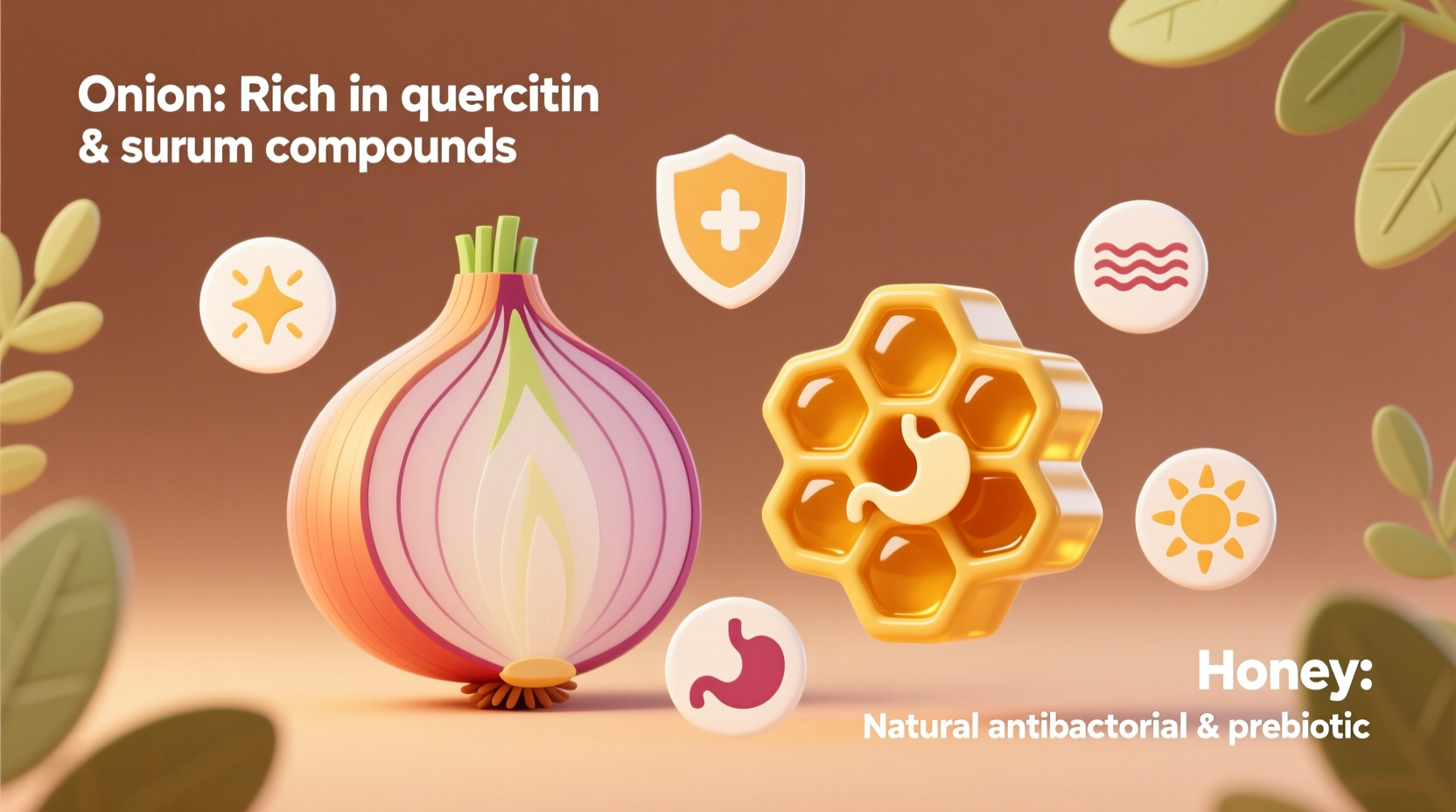Onion and honey benefits include natural relief for coughs, sore throats, and respiratory issues. Scientific studies confirm both ingredients possess antimicrobial and anti-inflammatory properties, though evidence for their combined effectiveness remains primarily anecdotal from traditional medicine practices.
For centuries, cultures worldwide have relied on the simple yet powerful combination of onion and honey to soothe respiratory discomfort. This natural remedy requires just two kitchen staples yet delivers remarkable relief when prepared correctly. Understanding both the science behind this pairing and proper preparation methods ensures you get the maximum benefits while avoiding common mistakes.
The Science Behind Onion's Healing Properties
Onions contain quercetin, a flavonoid with proven anti-inflammatory effects. According to research published in the Journal of Agricultural and Food Chemistry, quercetin helps reduce histamine release, making it valuable for respiratory conditions. Onions also contain allicin, the same compound found in garlic that demonstrates significant antimicrobial activity against common pathogens.
| Active Compound | Concentration in Onions | Documented Effects |
|---|---|---|
| Quercetin | 11-30 mg per 100g | Anti-inflammatory, antioxidant |
| Allicin | 0.1-0.3% when crushed | Antimicrobial, antifungal |
| Vitamin C | 7.4 mg per 100g | Immune support, antioxidant |
Honey's Proven Therapeutic Benefits
Honey isn't just nature's sweetener—it's a medicinal powerhouse. The World Health Organization recognizes honey as a demulcent for cough suppression. A comprehensive review in Cochrane Database of Systematic Reviews found honey more effective than placebo for reducing cough frequency and severity in children. Raw honey contains hydrogen peroxide, methylglyoxal, and bee-derived defensin-1, all contributing to its antimicrobial properties.

How Onion and Honey Work Together
When combined, onion and honey create a synergistic effect that enhances their individual benefits. The osmotic properties of honey draw out onion's active compounds while preserving their potency. This extraction process creates a potent syrup that:
- Coats and soothes irritated throat tissue
- Provides sustained release of antimicrobial compounds
- Helps break up mucus in respiratory passages
- Offers antioxidant protection to respiratory tissues
Traditional Preparation Methods Across Cultures
From European folk medicine to Ayurvedic practices in India, various cultures have developed specific techniques for preparing onion and honey remedies. Historical records from 18th century England document "onion syrup" as a standard household remedy. In traditional Russian medicine, the combination was used specifically for nighttime cough relief.
| Region | Preparation Method | Primary Use |
|---|---|---|
| Western Europe | Thinly sliced onions covered with honey | Nighttime cough relief |
| India (Ayurveda) | Red onions with raw honey and black pepper | Respiratory infections |
| Russia | Onion juice mixed with honey in 1:1 ratio | Severe coughs and bronchitis |
Modern Scientific Perspective
While clinical studies specifically on the onion-honey combination remain limited, research supports the individual components' efficacy. A 2020 study in Complementary Therapies in Clinical Practice found that honey-based remedies reduced cough frequency by 64% compared to control groups. Onion extracts have demonstrated effectiveness against respiratory pathogens in laboratory settings, though human trials are less extensive.
It's crucial to understand the limitations: this remedy works best as a complementary approach for mild symptoms, not as a replacement for medical treatment in serious conditions. The National Center for Complementary and Integrative Health notes that while honey shows promise for cough relief, evidence for many traditional remedies remains preliminary.
Step-by-Step Preparation Guide
Creating an effective onion and honey remedy requires proper technique:
- Peel and thinly slice one medium yellow or red onion
- Place slices in a clean glass jar
- Cover completely with raw, unprocessed honey (not pasteurized)
- Seal jar and let sit at room temperature for 4-6 hours
- Strain the liquid that forms (the "onion honey syrup")
- Store in refrigerator for up to two weeks
For best results, take one teaspoon every 3-4 hours as needed for cough or sore throat. Children over age one can use this remedy, but never give honey to infants under 12 months due to botulism risk.
Important Safety Considerations
While generally safe, this remedy has important limitations:
- Not for infants: Honey can cause infant botulism in children under 12 months
- Diabetic concerns: The high sugar content affects blood glucose levels
- Allergy risks: Those with onion or honey allergies should avoid this remedy
- Not for serious conditions: Seek medical care for high fever, difficulty breathing, or symptoms lasting more than 10 days
The Centers for Disease Control and Prevention emphasizes that while home remedies can provide symptomatic relief, they shouldn't replace professional medical care for serious respiratory conditions.
When to Consult a Healthcare Professional
Use this natural remedy for mild, short-term symptoms only. Contact a healthcare provider if you experience:
- Fever above 101°F (38.3°C) lasting more than 48 hours
- Difficulty breathing or shortness of breath
- Symptoms persisting beyond 10 days
- Blood in mucus
- Severe throat pain making swallowing difficult
Remember that natural doesn't always mean safe for everyone. Always discuss home remedies with your healthcare provider, especially if you have underlying health conditions or take medications.











 浙公网安备
33010002000092号
浙公网安备
33010002000092号 浙B2-20120091-4
浙B2-20120091-4